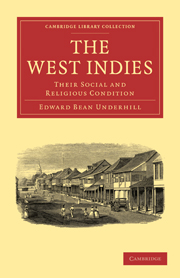Summary
The Baptist Mission in Trinidad was formed in the year 1843, when the Rev. George Cowen, shortly before an agent of the Mico Charity, commenced preaching the gospel in Port of Spain. At this period but few evangelistic exertions had been made for the spiritual and moral well being of the emancipated population. The United Presbyterian Church, or rather the Scotch Secession Church, supported two missionaries. Their station in Port of Spain was founded in 1835; that at Arouca in 1842. The Wesleyan Mission had three agents in the island. The influence of the Church of England was slight, its ministrations being almost entirely confined to the few English. The Church of Rome claimed to be the Church of the people, though its priests set an example of contempt for moral obligations, only too readily followed by their uninstructed adherents. The moral condition of the mass of the community is described at this time as being truly frightful. Even in comparison with the Creoles of Jamaica, they were “awfully demoralized.” There was an utter indifference to spiritual things. Superstitious practices, partly of Romish, partly of Pagan origin, everywhere prevailed. No progress had been made since emancipation in remedying the evils produced by slavery. Concubinage was almost universal; education was little regarded by the dominant sects; idleness and repugnance to labour marked the conduct of the enfranchised population. Great numbers were content to squat upon unoccupied land, satisfied with fruits of trees and the produce of their scanty toil.
- Type
- Chapter
- Information
- The West IndiesTheir Social and Religious Condition, pp. 16 - 38Publisher: Cambridge University PressPrint publication year: 2010First published in: 1862

